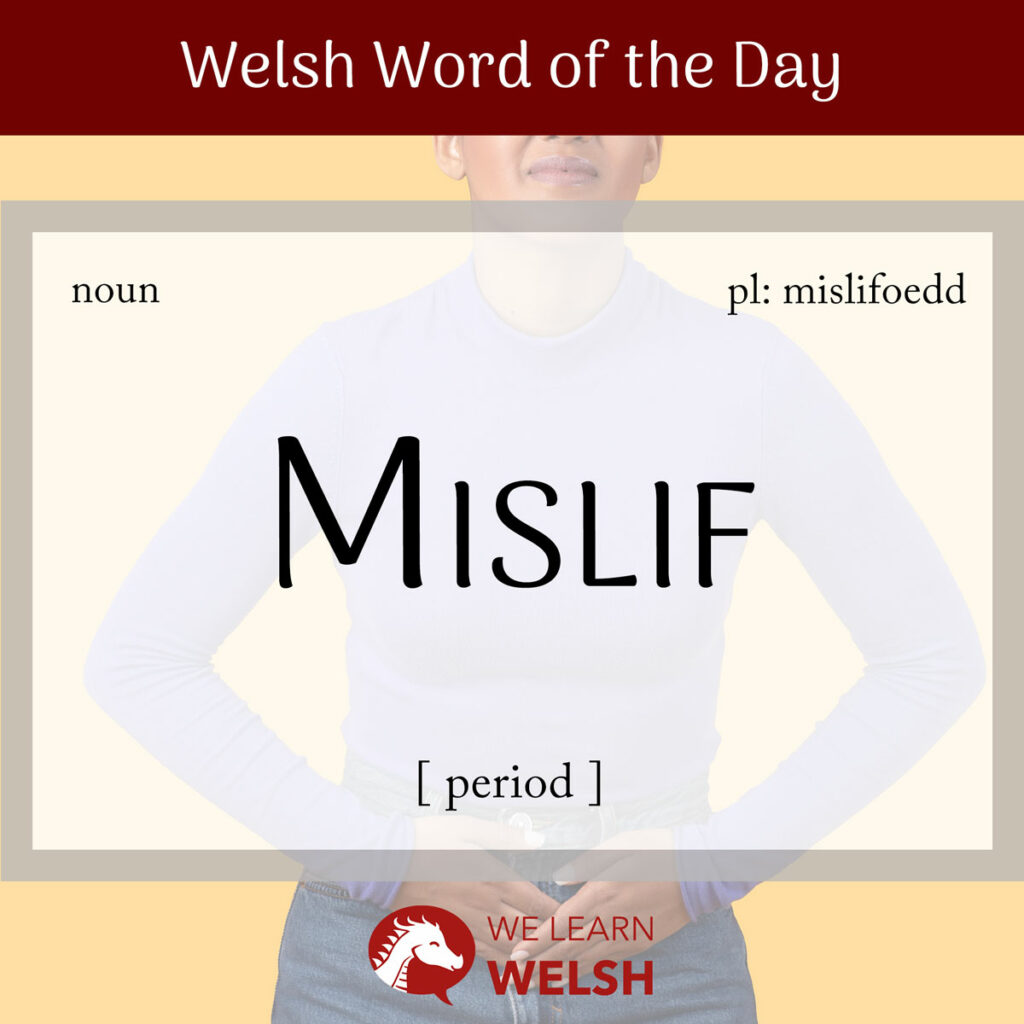Today’s word of the day is mislif (plural: mislifoedd), which means period or menstruation. The menstrual period is also commonly referred to as misglwyf (plural: misglwyfau), so keep an eye out for both of these variations.
mislif
period
Mislif is a masculine noun and is only susceptible to the soft mutation.
Soft mutation
fislif
Nasal mutation
N/A
Aspirate mutation
N/A
Misglwyf and mislif are both compound words. Misglwyf is made up of mis (month) and clwyf (wound). Mislif is made up of mis (month) and llif (flow). In Welsh, the second part of a compound word is usually softly mutated; here we can see that llif mutates to lif and clwyf mutates to glwyf.
The Welsh word for compound word is itself a compound word: cyfansoddair which is made up of cyfansawdd (compound) and gair (word), which soft-mutates to air. You can also say gair cyfansawdd, but that’s less fun in my opinion!
In Welsh, like in countless other languages, people often refer to y mislif using a mwythair (euphemism). (You may notice mwythair is yet another compound word, made up of mwyth, an old word for luxury, and gair!) This is partially due to the cywilydd (shame) associated with women’s cyrff (bodies) and rhywioldeb (sexuality). Despite getting a period every month and being raised and educated in Welsh, I only learned the word mislif after sheepishly looking up period in a Welsh dictionary at school – to me, it felt like a dirty word.
Dw i heb ddechrau fy mislif.
I haven’t started my period.
This is sadly not an uncommon experience – students still stay home from school and drop out of chwaraeon (sports) and gweithgareddau cymdeithasol (social activities) because they feel the need to hide the fact they are on their period. Unsurprising, considering that Plan International UK found that 57% of respondents faced negative comments about their period, such as being called moody or disgusting. Llywodraeth Cymru (the Welsh Government) has taken some measures to address these problems, such as their Balch o’r Mislif (Period Proud) initiative, but there’s still a long way to go before the ystrydebau rhywiaethol (sexist stereotypes) around periods can finally be retired.
Welsh euphemisms for y mislif include yn ei blodau (in her flowers), blodeuo (to flower), and cwarfod misol (monthly meeting). Cwarfod is an informal version of cyfarfod, meaning meeting. In Welsh, the f sound is sometimes turned into a w sound to make a word quicker to say in an informal context. Here are some other examples:
- ysgrifennu (to write) becomes sgwennu
- ysgyfarnog (hare) becomes sgwarnog
As in English, Welsh people will also refer to y mislif as amser y mis (the time of the month) or simply gwaedu (bleeding). However, rather than saying that you are on your period, in Welsh it’s the other way around – the period is on you!
Mae’r mislif arna i.
I’m on my period.

Although y mislif is a meaningful and important experience for many people, it can also come with quite a lot of poen (pain) and discomfort. In South Wales, if you want to say that a body part is sore or generally not feeling good, you say that it is tost (ill). So, if you get your period in South Wales, you can complain about:
- pen tost (m) = headache
- bronnau tost = sore breasts
- bola tost (m) = upset stomach
In the North on the other hand, you would say that you have:
- cur pen (m)= headache
- bronnau poenus = sore breasts
- anhwylder ar y stumog (m) = upset stomach
Finally, wherever you are in Wales, the phrase poenau’r mislif (period cramps) is bound to be understood. Luckily, if the pain is not too severe, a poenladdwr (painkiller) and a potel ddŵr poeth (hot water bottle) can achub y dydd (save the day)! In addition, some countries such as Zambia, Japan, Taiwan and Spain (but not Wales) offer women seibiant mislif (menstrual leave) in case they are unable to work due to period-related pain.
Although you won’t often see it mentioned in history books, cylchred y mislif (the menstrual cycle) has marked the lives of half the people who have ever lived and people have always found ways of dealing with it. For instance, in Ancient Egypt (Yr Aifft), women used softened papyrus to soak up menstrual fluid. Nowadays, disposable period products such as cadachau mislif/misglwyf (sanitary towels/pads) and tamponau (tampons) are the norm in developed countries like Wales.
This is less than ideal; one study found that tampons and pads create 28,000 tons of waste in the UK every year, with over 3000 tons of this being lost in the environment. More cynaliadwy (sustainable) options such as washable cwpanau mislif (menstrual cups) and dillad isaf mislif (period underwear) are steadily catching on, although these options have a higher upfront price so remain inaccessible to many, especially since tlodi mislif (period poverty) remains a big problem in Wales and around the UK. In 2018, Plan International UK found that 10% of British girls aged between 14 and 21 couldn’t afford nwyddau hylendid mislifol (menstrual hygiene products).
Whether or not you get a period, I hope you show caredigrwydd (kindness) and parch (respect) to those in your life who do. But most of all, I hope you learned something interesting about mislif today!

